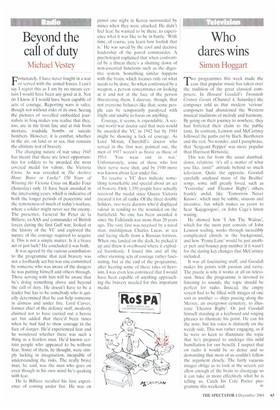Who dares wins
Simon Hoggart
r,o programmes this week made the ase that popular music has taken over the tradition of the great classical composers. In Howard Goodall's Twentieth Century Greats (Channel 4, Saturday) the composer told us that modern 'serious' composers had abandoned the Western musical traditions of melody and harmony. By going on their journey to nowhere, they had forfeited their claim to the public taste. In contrast, Lennon and McCartney followed the paths cut by Bach, Beethoven and the rest. No wonder, and I paraphrase, that 'Sergeant Pepper' was more popular than Harrison Birtwistle.
This was far from the usual dumbeddown, relativist, 'it's all a matter of what you like, Unlit?' attitude behind so much television. Quite the opposite. Goodall carefully analysed many of the Beatles' songs, some still greatly loved, such as 'Yesterday' and 'Eleanor Rigby'; others frankly awful, like 'Tomorrow Never Knows', which may he subtle, sinuous and inventive, but which makes us yearn to hear `Kajagoogoo', or John Cage's latest waxing_ He showed how 'I Am The Walrus', which for the most part consists of John Lennon wailing, works through incredibly complicated chords in the background, and how 'Penny Lane' would be just another pert and bouncy pop number if it wasn't for the daring key changes that McCartney included.
It was all fascinating stuff, and Goodall makes his points with passion and verve. The puzzle is why it works at all on television. Since the programme is devoted to listening to sounds, the topic should be perfect for radio. Instead, the empty screen had to be filled with images of one sort or another — ships passing along the Mersey, an overgrown cemetery, to illustrate 'Eleanor Rigby'. Or just Goodall himself standing at a keyboard and singing phrases to illustrate his point. He can hit the note, but his voice is distinctly on the weedy side. This was rather engaging, as if he were so keen to illuminate the topic that he's prepared to undergo this mild humiliation for our benefit. I suspect that on radio it would be so dense and so demanding that most of us couldn't follow the argument closely. The fairly vacuous images oblige us to look at the screen, yet allow enough of the brain to disengage so it can take in more effectively what he is telling us. Catch his Cole Porter programme this weekend.
Alan Yentob's Beautifid Dreamer (BBC 1, Wednesday), part of the Imagine series, was slightly less successful, though it did have Leonard Bernstein averring, as plumrnily as an American can get, Tor a long time now I have been fascinated by this strange and compelling scene called pop music.' Only 5 per cent of pop was any good, he said, 'but the good 5 per cent is so significant and so vital that it claims the attention of every thinking person'. That clearly included the Smile album made by Brian Wilson of the Beach Boys, which after 30-odd years is finally on release. For Wilson fans, this is as if exact replicas of the Holy Grail were now on sale in department stores.
Trouble is that Wilson, now in his sixties, can't sing. Many of the songs on the new album are already familiar — 'Good Vibrations', 'Heroes and Villains', 'Vegetables', and `Surf's Up', which is a lovely and haunting song ruined by its composer's voice, The images of the tortured, despairing genius seeking perfection at home while the rest of the Beach Boys bounced around the world singing about cars and surfing and lovely tanned girls was powerful and moving, marred only by the fact that the album, which I have bought, turns out to be deeply embarrassing. Howard Goodall sings better.
Fungus the Bogeyman (BBC1, Sunday) is enormously clever, combining live actors to play the humans and computer trickery to produce the bogeymen. It's full of deft jokes which will appeal to adults as much as to children — perhaps even more. Fungus himself hates the dreary, nighttime routine of frightening humans (or 'dry cleaners', as they call us). Far from being scary, he's a wimp, unable to control his rebellious teenage son. Mother: 'You've been using deodorant, haven't you?' Son: 'Maybe I don't like being dirty all the time!' Mark Haddon, the scriptwriter, has invented excellent bogey homilies: 'Strike while the biscuit's furry, that's what I say!' It is, however, too long. As often happens when a programme is a triumph of technical achievement, the makers fall in love with the nuts and bolts and neglect the action. Half an hour an episode would be long enough.
The Dobsons of Duncraig (BBC1, Thursday) follows an extended Midlands family of 17 people, who take over a 150year-old castle in the Highlands. It's meant to be reality TV meets Monarch of the Glen. But, sadly, the Dobsons aren't really interesting enough. I'm sorry, no offence, but I really don't care about their squabbles or their problems, which are no more fascinating amid majestic scenery than they w-ould have been back in Leicestershire.
Bears: Spy in the Woods (BBC I) was lovely and revealing, and beautifully narrated by David Attenborough, of course. But the background music was inappropriate and horribly intrusive. Did you know that background music is the main cause of all viewers' complaints about television? It creates far more anger than sex, violence or anyone on I'm A Celebrity.



















































































 Previous page
Previous page